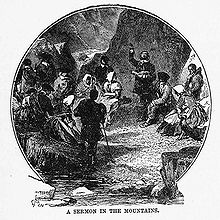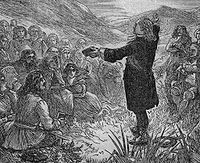
Conventicle Act 1664
Encyclopedia


Act of Parliament
An Act of Parliament is a statute enacted as primary legislation by a national or sub-national parliament. In the Republic of Ireland the term Act of the Oireachtas is used, and in the United States the term Act of Congress is used.In Commonwealth countries, the term is used both in a narrow...
of the Parliament of England
Parliament of England
The Parliament of England was the legislature of the Kingdom of England. In 1066, William of Normandy introduced a feudal system, by which he sought the advice of a council of tenants-in-chief and ecclesiastics before making laws...
(16 Charles II
Charles II of England
Charles II was monarch of the three kingdoms of England, Scotland, and Ireland.Charles II's father, King Charles I, was executed at Whitehall on 30 January 1649, at the climax of the English Civil War...
c. 4) that forbade conventicle
Conventicle
A conventicle is a small, unofficial and unofficiated meeting of laypeople, to discuss religious issues in a non-threatening, intimate manner. Philipp Jakob Spener called for such associations in his Pia Desideria, and they were the foundation of the German Evangelical Lutheran Pietist movement...
s (religious assemblies of more than five people outside the auspices of the Church of England
Church of England
The Church of England is the officially established Christian church in England and the Mother Church of the worldwide Anglican Communion. The church considers itself within the tradition of Western Christianity and dates its formal establishment principally to the mission to England by St...
). This law was part of the Clarendon Code, named after Edward Hyde, 1st Earl of Clarendon
Edward Hyde, 1st Earl of Clarendon
Edward Hyde, 1st Earl of Clarendon was an English historian and statesman, and grandfather of two English monarchs, Mary II and Queen Anne.-Early life:...
, which aimed to discourage nonconformism
Nonconformism
Nonconformity is the refusal to "conform" to, or follow, the governance and usages of the Church of England by the Protestant Christians of England and Wales.- Origins and use:...
and to strengthen the position of the Established Church. However the Clarendon Code was not actually the work of Clarendon himself, who favoured a policy of greater tolerance towards dissenters. These prohibitions led many, such as the Covenanter
Covenanter
The Covenanters were a Scottish Presbyterian movement that played an important part in the history of Scotland, and to a lesser extent in that of England and Ireland, during the 17th century...
s, to vacate their parishes rather than submit to the new Episcopal authorities. Just as the ministers left so too did the congregations, following their old pastors to sermons on the hillside. From small beginnings these field assemblies-or conventicles-were to grow into major problems of public order for the government.
Other statutes that were part of the Clarendon Code include:
- the Quaker Act, 1662, which required people to swear an oath of allegiance to the king, which QuakersReligious Society of FriendsThe Religious Society of Friends, or Friends Church, is a Christian movement which stresses the doctrine of the priesthood of all believers. Members are known as Friends, or popularly as Quakers. It is made of independent organisations, which have split from one another due to doctrinal differences...
did not do out of religious conviction.
- the Act of Uniformity 1662Act of Uniformity 1662The Act of Uniformity was an Act of the Parliament of England, 13&14 Ch.2 c. 4 ,The '16 Charles II c. 2' nomenclature is reference to the statute book of the numbered year of the reign of the named King in the stated chapter...
, 14 Charles II c. 4 (1662), which required the use of all the rites and ceremonies in the Book of Common PrayerBook of Common PrayerThe Book of Common Prayer is the short title of a number of related prayer books used in the Anglican Communion, as well as by the Continuing Anglican, "Anglican realignment" and other Anglican churches. The original book, published in 1549 , in the reign of Edward VI, was a product of the English...
in church services;
- the Five Mile Act, 17 Charles II c. 2, (1665), which sought to prevent nonconformists from living in incorporatedCorporationA corporation is created under the laws of a state as a separate legal entity that has privileges and liabilities that are distinct from those of its members. There are many different forms of corporations, most of which are used to conduct business. Early corporations were established by charter...
and charterCharterA charter is the grant of authority or rights, stating that the granter formally recognizes the prerogative of the recipient to exercise the rights specified...
ed towns.
The operation of these laws at least as far as Protestants
Protestantism
Protestantism is one of the three major groupings within Christianity. It is a movement that began in Germany in the early 16th century as a reaction against medieval Roman Catholic doctrines and practices, especially in regards to salvation, justification, and ecclesiology.The doctrines of the...
were concerned was mitigated somewhat by Charles II's Royal Declaration of Indulgence
Royal Declaration of Indulgence
The Royal Declaration of Indulgence was Charles II of England's attempt to extend religious liberty to Protestant nonconformists and Roman Catholics in his realms, by suspending the execution of the penal laws that punished recusants from the Church of England...
in 1672, which suspended the execution of penal law
Penal law
In the most general sense, penal is the body of laws that are enforced by the State in its own name and impose penalties for their violation, as opposed to civil law that seeks to redress private wrongs...
s and allowed a certain number of non-conformist chapel
Chapel
A chapel is a building used by Christians as a place of fellowship and worship. It may be part of a larger structure or complex, such as a church, college, hospital, palace, prison or funeral home, located on board a military or commercial ship, or it may be an entirely free-standing building,...
s to be staffed and constructed, with the pastors subject to royal approval.
The Conventicle Act and Five Mile Act were repealed in 1689.
(The '16 Charles II c. 2' nomenclature is reference to the statute book of the numbered year of the reign of the named King in the stated chapter. This is the method used for Acts of Parliament
Act of Parliament
An Act of Parliament is a statute enacted as primary legislation by a national or sub-national parliament. In the Republic of Ireland the term Act of the Oireachtas is used, and in the United States the term Act of Congress is used.In Commonwealth countries, the term is used both in a narrow...
from before 1962.)
Jewish reaction
Although aimed at Nonconformists, when the Conventical Act was passed, the Jews led by their new rabbi, Jacob Sasportas, took their anxieties to Charles II, who told them, ‘laughing and spitting’, not to worry; later the Privy CouncilPrivy council
A privy council is a body that advises the head of state of a nation, typically, but not always, in the context of a monarchic government. The word "privy" means "private" or "secret"; thus, a privy council was originally a committee of the monarch's closest advisors to give confidential advice on...
put it in writing that Jews could ‘promise themselves the effects of the same favour as formerly they have had, so long as they demean themselves peaceably and quietly, with due obedience to His Majesty’s laws and without scandal to his government’. Thus the English Jews
British Jews
British Jews are Jews who live in, or are citizens of, the United Kingdom. In the 2001 Census, 266,740 people listed their religion as Jewish. The UK is home to the second largest Jewish population in Europe, and has the fifth largest Jewish community worldwide...
, by an act of omission, as it were, became full citizens, subject to no more disabilities than those inherent in their own unwillingness, like Catholics and Nonconformists, to belong to the Church of England or, in their particular case, to swear Christian oaths.

